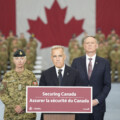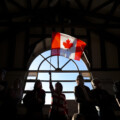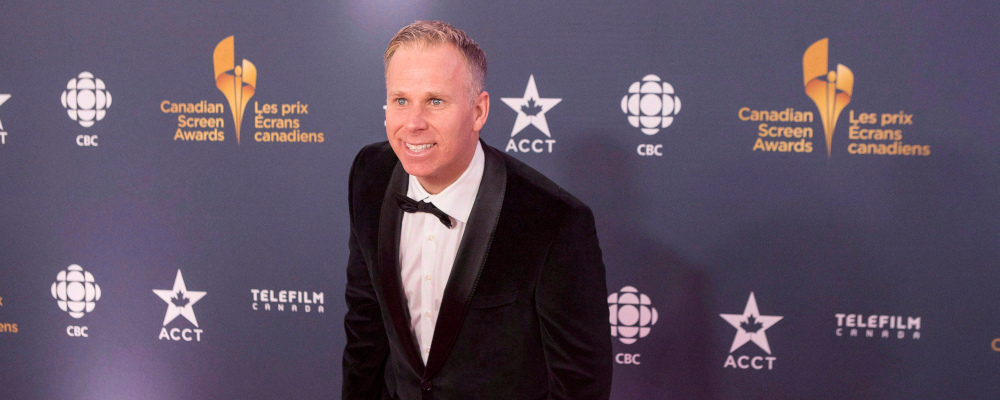In a recent essay, Hub contributor Rahim Mohamed took a brave stand in defence of the CBC: rather than defund it, he argued that we should increase public support for the national broadcaster.What South Korea can teach Canada about soft power https://thehub.ca/2022-05-23/what-south-korea-can-teach-canada-about-soft-power/ While conceding that the CBC’s news division may be beyond redeeming, he argues that its cultural content can be leveraged into a useful tool of soft geopolitical power.
By bolstering support for the creation and export of cultural products like film and television, Mohamed believes that Canada can grow its international “relevance.” He sees the potential benefits as two-fold: the export of cultural products can generate feelings of familiarity and closeness, making it harder for foreign leaders to stir up popular resentment against us (curiously, America’s cultural hegemony doesn’t seem to have had this effect). Slightly more plausibly, he suggests that successful cultural exports would improve Canada’s global visibility, lowering the odds that we get passed over again for diplomatic baubles like temporary membership in the UN Security Council.
Mohamed points to the international market success of Canadian shows like Schitt’s Creek as evidence of the CBC’s role in incubating domestic talent and turning out marketable cultural products. But we could go further, he says: we could emulate South Korea, whose most notable exports in the last decade include K-pop, soap operas, radical cosmetic-surgery procedures, and film and television shows like the gore-filled Squid Game, and the Oscar-winning Parasite, a story of deception and class conflict that likewise ends in a bloodbath.
I’m skeptical. Whether or not cultural exports generate feelings of warmth depends on the content of those products, and cultural imperialism can provoke resentment and aversion just as easily as it can inspire admiration. Familiarity, in other words, can breed contempt. The South Korean film and television shows mentioned above are impressive in their storytelling and production values, but they depict a nightmarish country of artifice, nihilism, cut-throat competition, and grotesque economic inequality. They might have succeeded in growing the country’s global visibility, but the unfortunate effect is to make the Korean peninsula seem like two sides of a dystopian coin, neither of which is especially hospitable to human life.
Mohamed also forgets that Canada’s domestic entertainment industry is already nearly twice the size of South Korea’s. But unlike K-pop or Squid Game, few of our cultural products are distinctively or recognizably Canadian, and therefore have little use as tools of soft power. The success of our film and television industry—and of so many Canadian actors, directors, and musicians—is largely a function of our ability to pass as American. To the extent that our film and television exports do generate feelings of familiarity and affection among international audiences, it’s not clear that Canada reaps the benefits.
None of this is to say that there shouldn’t be more public funding for the arts. There absolutely should be—just not for the utilitarian reasons that Mohamed suggests. Public patronage of the arts should not be to make money, win over foreign publics, or gain seats in morally decrepit multilateral institutions. It should be to create something that the market will not produce because, being priceless, it does not value it: culture.
In anthropological terms, culture comprises the customs, habits, institutions, beliefs, languages, traditions, and stories that define a particular group of people living in a specific time and place. It is what marks human groups as unique, binding them together as a cohesive “we.” This general or common culture, as we’ll call it, is what makes social cooperation and solidarity possible.
This type of culture is acquired without effort; we are all the products of it, whether we like it or not. It is the source of our innumerable unexamined values, preferences, and prejudices. It conditions our tastes, delimits the range of choices available to us, and provides us with the scripts and moral codes by which we organize our lives. It is, to use a botanical analogy, the soil in which our souls take root and are cultivated. If we want to develop the fulness of our potential, we had better hope that it is a rich and nourishing ground.
Because common culture surrounds us imperceptibly, we may easily forget how tenuous it is, and how much it needs protection against the powerful disintegrative and homogenizing forces of global consumerism. To that end, the idea of a national public broadcaster dedicated to shoring up and preserving our distinct national culture is a good one. Cultural institutions that tell our nation’s story, and present it as something deserving of love, can generate pride and belonging across geographic, socio-economic, ethnic, and religious lines. It can foster a sense of fellowship, and a willingness to sacrifice for one another. This is especially important in a pluralistic society like Canada, which faces pressure to integrate nearly a half-million new immigrants each year.
There is, furthermore, a legitimate public interest—and a compelling state interest—in ensuring that our general culture remains capable of socializing us into responsible citizenship: by providing the moral guideposts and normative scripts to help us order our lives well; supporting those mediating institutions from which we derive a sense of meaning and belonging; and reinforcing the habits and virtues that qualify us for the exercise of civil liberties—things like temperance, civic-mindedness, trustworthiness, industry, self-restraint, charity, and intellectual discernment.
Public stewardship of cultural institutions and norms is necessary because the incentives of the marketplace—and the logic of liberalism—aggressively militate against them. The market has no interest in producing people who are capable of placing voluntary checks on their appetites. The entire business model of limbic capitalismVirtue And Vice In An Age Of Addiction https://www.theamericanconservative.com/articles/virtue-and-vice-in-an-age-of-addiction/ involves degrading our capacity for self-control and turning us into creatures of pure, unmediated mimetic desire: maximally atomized, rootless, cultureless, with no attention span, no responsibilities or obligations, and no ambitions or purpose beyond consuming things and chasing the next dopamine hit.
A rich culture insulates us from the corrosive forces of the market. And one type of culture, in particular, is uniquely capable of liberating us from shallow consumerism: high culture, epitomized by profound and enduring works of art, philosophy, scholarship, and literature. Whereas a common culture defines particular people, anchored in a time and place, high culture transcends particularisms, speaking to universal and eternal human aspirations. It transports us beyond the here and now and draws our sights upward in contemplation.
High culture is often distinctly undemocratic: not a product of popular tastes, but an escape from them. It frees us from being merely children of our own time and allows us to see clearly and judge our lives and our societies through reference to something higher. Because it does not exist to flatter democratic tastes, it may not have mass commercial appeal. Neither is it useful—at least not in the way that the market easily recognizes or supports.
This, ultimately, is the best justification for state and philanthropic funding of the arts: patronage is often necessary to promote priceless cultural goods whose value the market does not recognize and may even be hostile to. Without imperial, aristocratic, or ecclesiastic sponsors, we would be deprived of nearly the entirety of the classical musical canon. Were it not for the Medicis, we might not know the names of Michelangelo, Da Vinci, or Botticelli. Without the commission of Emperor Shah Jahan, there would be no Taj Mahal. Dr. Johnson scorned the patronage system and the pensioners who profited from it (Johnson’s dictionary defined a pension as “pay given to a state hireling for treason to his country”), but even he benefited from a £300 per month pension from King George III. The world is better for it.
There was a time when Canada’s national public broadcaster understood this. From 1954 to 1977, for example, the CBC produced over 19 hours of television specials and concerts featuring Glenn Gould. It was a noble undertaking, giving all Canadians, irrespective of social class or background, an opportunity to experience Bach’s Concerto No. 7 in G major,Glenn Gould – Bach, Concerto No. 7 in G minor OFFICIAL https://www.youtube.com/watch?v=qEHsDe5Vaxg or Beethoven’s Piano Sonata No.3 in E major Op. 109,Glenn Gould – Beethoven, Piano Sonata No. 30 in E major op. 109 (OFFICIAL) https://www.youtube.com/watch?v=FW7WGAOCKHo&t=123s as performed by one of the greatest pianists of the 20th century. Yet it was also rightly and unabashedly elitist and defiant of popular tastes. In one interview, Gould pronounced his disdain for the tyranny of popular opinion: “I detest audience,” he said. “Not in their individual components. But en masse, I detest audiences. I think they’re a force of evil…a rule of mob law.”Glenn Gould – Interview with Alex Trebek: “I detest audiences” (OFFICIAL) https://www.youtube.com/watch?v=1nZTgAGSajA&t=50s
High culture is often distinctly undemocratic
The CBC continues to produce programming that defies popular taste, but not for the right reasons. Our national public broadcaster has almost entirely abandoned its role as patron and promoter of high culture: rather than Gould’s interpretation of Art of Fugue, CBC television’s current musical offering is limited to children performing “kidified” American pop songs on ukulele with celebrity guest stars—a lazy capitulation to both tasteless consumerism and American cultural hegemony.
What about socializing us into the habits of responsible citizenship? Does the CBC present us with examples of moral exemplars whose lives are worthy of emulation? Does it encourage virtues of civic-mindedness and service, or promote institutions like marriage and participation in a faith community which, for the vast majority of people, lead to happier and more meaningful lives?What Americans Think about Poverty, Wealth, and Work https://www.cato.org/publications/survey-reports/what-americans-think-about-poverty-wealth-work#who-finds-most-meaning-purpose Does the CBC inform viewers of our history or educate us about our institutions? Does it provide shared cultural touchpoints, stories, and experiences that could bring us together as Canadians across racial, religious, and class lines?
On all counts, no.
Scan through the CBC’s entertainment lineup, and you’ll encounter shows like Sort Of, a sitcom about a non-binary millennial who “straddles various identities” as they work as a “sexy bartender.” Or Twenties, which “follows a queer Black woman and her two straight best friends” as they “figure out life.” Hiccups and Hookups stars a recently divorced mother, her “commitment-phobic younger brother” and “confused teenage daughter” as they struggle to navigate “dating, relationships, and life.” This is not to be confused with Casual, a sitcom about a “bachelor brother and his newly divorced sister” who “coach each other through the crazy world of dating,” while also raising a teenage daughter. And then there’s Zarqa, about a divorced, middle-aged woman who “strives to reinvent herself…until her impulsive and vindictive personality gets in the way.” For a change of pace, viewers can tune in to Canadian Ballroom Extravaganza, featuring “10 queer and trans filmmakers” participating in ballroom dancing in categories such as “Bizarre, Vogue, and Sex Siren.”
Rather than providing us with the basis for a shared civic culture, the CBC’s entertainment lineup is built on self-obsession and niche intersectional identities. Instead of examples to emulate, we get dysfunctional adults grappling with personality disorders and navigating post-divorce hookup culture. At best, the CBC could be said to be providing a mirror: a representative reflection of Canadian culture as it exists today (at least as it exists in downtown Toronto). But this is an abdication of responsibility; it neglects the role that cultural institutions have not just in reflecting, but in shaping culture, by either upholding or undermining its foundations. Where the CBC could be providing edification by drawing us towards things that are beautiful and eternal, it instead encourages us to lower our sights, presenting us with characters whose awfulness is, I assume, meant to make us feel better about our own.
There is a vital role for public patronage of the arts, and for a national public broadcaster that defies the spirit of the age and the liquifying forces of the marketplace. But the CBC has relinquished that role, and with it, the right to public funding.
Recommended for You

Trevor Tombe: How is Carney going to pay for his commitments? There are some tough choices ahead

Need to Know: Legacy media has a diversity problem

‘A celebration of the spirit of Alberta’: Ryan Hastman on the political, economic, and cultural importance of the Calgary Stampede

‘Can we actually be an independent country?’: Michael Ignatieff on the 60th anniversary of Lament for a Nation



